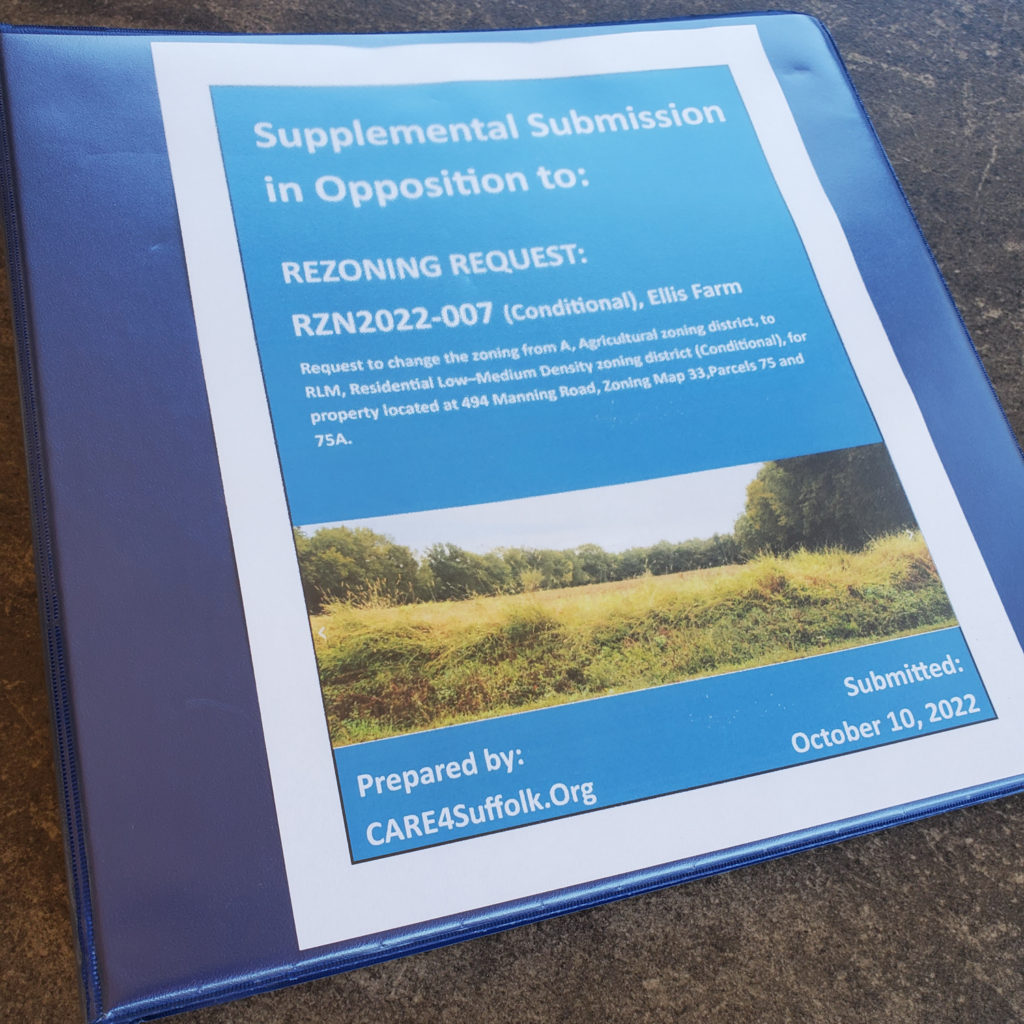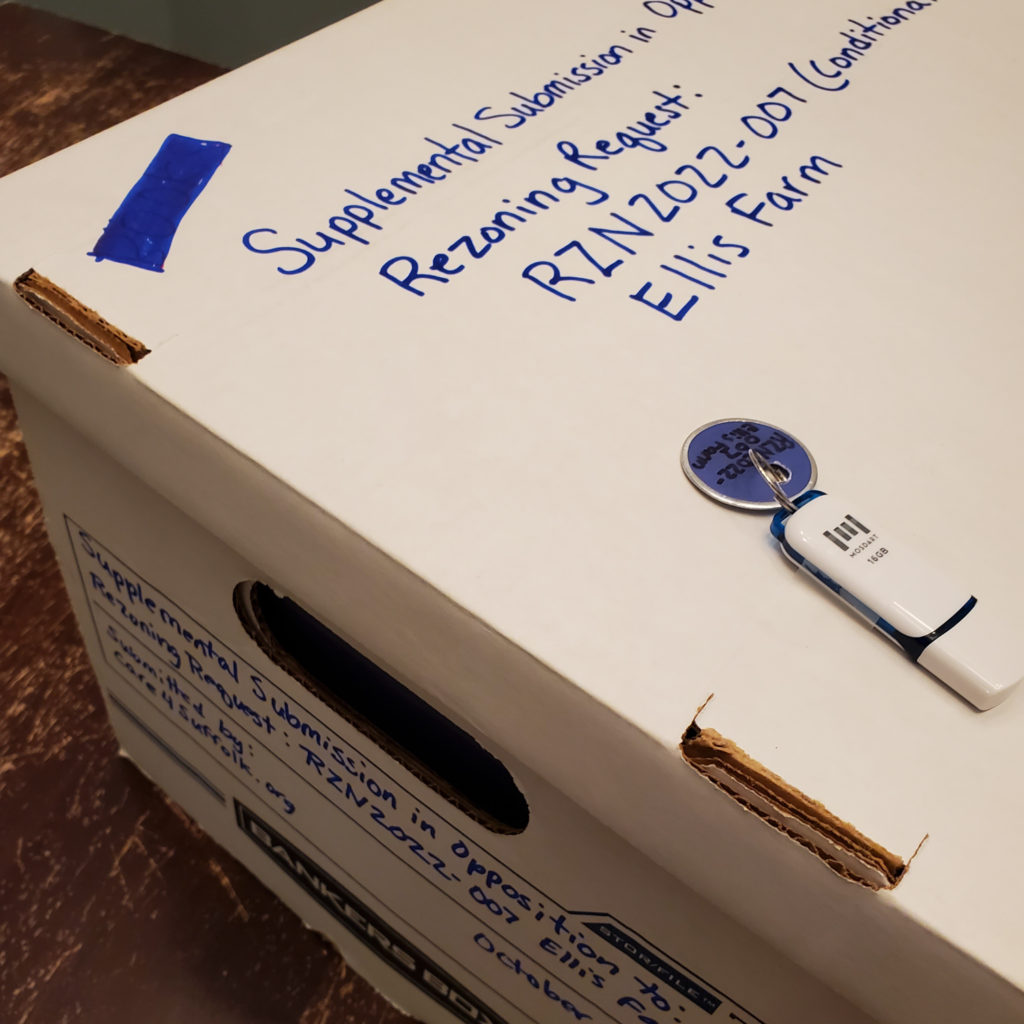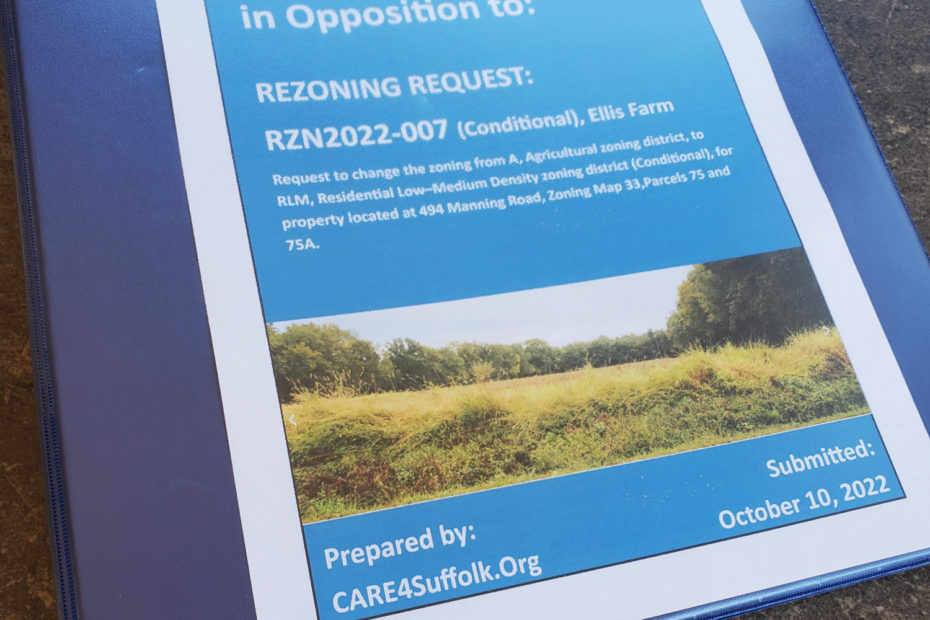The Ellis Farm rezoning request has not gone before the Planning Commission with a public hearing yet, but CARE4Suffolk is ready when that day happens. In early September, when neighbors of Ellis Farm realized that a developer applied for rezoning of the land with the intention of building 300 houses, they gathered together to form a group to oppose this rezoning and came up with a plan of action.
When rezoning signs get posted by the city, there are only two short weeks for citizens to learn about the rezoning, gather information and research, and if they oppose the rezoning, it does not leave them much time to make a plan to oppose the rezoning. CARE4Suffolk would like share what we did to prepare for the Ellis Farm opposition.
Our first step was to contact the city and learn all we could about what the rezoning is, what the plan for the property is and where in the rezoning process it is. Next, as neighbors we started to connect with one another about this. We were emailing each other, calling, and bringing it up in conversation as we ran into each other. One of our neighbors organized a meeting to bring everyone together to figure out what we can do to stop the rezoning. She reached out to our city council member as well.
At our first community meeting at the house of one of our neighbors, where around 20 people attended, we discussed what our options are and let everyone have a chance to share their thoughts. The meeting was about 5 days before the scheduled Planning Commission meeting, so there wasn’t a lot of time. We decided to focus on two main areas of concern: overcrowded schools and traffic/safety on Manning Road. We asked for volunteers to speak before the city and two volunteers offered their help with research and writing. With this group of five, we worked the weekend to prepare the speeches and documentation to be delivered to the city the following Tuesday. We had an online petition gathering scores of signatures daily. We also had several people outreaching to the broader community to gain more support. Our plan was to have as many community members show up to the Planning Commission meeting as possible, and when our first speaker asked for anyone present who opposes the Ellis Farm rezoning to please stand up, our group would stand en masse. Our outreach was done through social media, emails, phone calls, and the monumental task of delivery flyers up and down Manning Road and the surrounding communities. We asked community members to ask their friends, family, and neighbors is Suffolk to join us.
As it turned out we were able to gather a crowd of about 50 people. We all showed up early to City Hall but the developer got wind of our opposition and requested the item to be tabled. The public hearing for the Ellis Farm was tabled for 30 days. At first we were all very disappointed and frustrated by this, but in the end it worked in our favor. Thirty days gave us a lot more time to prepare. We jumped right into preparations for the next Planning Commission meeting. One member of our group began getting t-shirts printed. Another started a website. We also decided to organize our volunteers into teams to better spread out the workload. In addition, our researchers grew in number and they had more time to perfect our arguments against rezoning. Our outreach team continued to deliver flyers, make calls, and post online. In addition, we held a series of public meeting inviting anyone in the community to come and bring a friend, to learn more about what we were planning.

CARE4Suffolk’s Blue Binder with each argument in opposition to the rezoning and each piece of documentation in its own labeled tab.

“Opposition in a Box”: This banker’s box contained eight blue binders from CARE4Suffolk, one for each Planning Commissioner, along with a thumb drive with a digital version.
From our first Planning Commission meeting we learned that emailing our substantial documentation, which was then printed by the city, and provided to the Commissioners, was not the best format to provide our detailed arguments opposing the rezoning. One member came up with the idea to organize our research into binders. Our research and writing team began to prepare these. We sorted our binders into sections, with each argument in opposition and each supporting document having its own tab to quickly reference. We duplicated this is a digital format. The week before the October Planning Commission meeting, all of our documents were due to be handed into the city. One member boxed up eight binders into a banker’s box and attached a thumb drive with the electronic version, and then delivered it to the city. We have dubbed this our “Opposition in a Box”.
By the end of the thirty days, our membership had multiplied and we began to make contacts with other Suffolk residents who were experiencing rezoning issues of their own. We began to collaborate and to share information and resources. The Lake Kilby group was scheduled to appear before the Planning Commission at the same time and their rezoning plight shared so many issues with our Ellis Farm rezoning. We decided to coordinate. We attended each other’s meeting and we shared our binder with them as well as our strategy. Our rezoning got pulled from the agenda by the developer, so we did not end up having our public hearing, but we were happy to be able to join forces with Lake Kilby and stand for them, as they were prepared to stand for us, to oppose the irresponsible rezoning on Lake Kilby Road. We are excited that the Planning Commissioners voted against recommending the Lake Kilby rezoning. We hope to persuade them to vote against rezoning Ellis Farm when we get a chance to have our public hearing.
If you are facing a rezoning request near you, and you have concerns about its impact, feel free to use any of our strategy to help your cause. Here is a link to our digital binder. It shows our arguments in opposition and the research we collected, and how we organized it all. If your rezoning concern is in Suffolk, consider completing our Rezoning Concern Form to let us know more about it.

I live at the southern end of manning rd but am very upset with all of this rezoning that is going on. I have kids that’s go to Lakeland high that are having issues with lack of teachers and being forced to take online courses. When will the city stop and realize what they are doing.
Thank you for your comment. Lakeland High School is not listed as an overcrowded school, but many of our schools, even though they are not at capacity, do not have the staff to properly serve the students attending there. This is a big problem that needs to be solved before more kids are added to the schools. I would be interested in learning more about the issues you and your son are having. Would you be willing to email me at care4suffolk@gmail.com to give me more details? I was not aware students had to take online classes due to lack of teachers and would really appreciate hearing more about it.
Please consider coming to our Thursday, November 17th meeting. The Suffolk 2045 Comprehensive Plan is used as a basis for many aspects of city planning, not just rezoning, it also influences schools as well. Your voice is needed.
I live on Kings Fork rd. and we have just been administered a set back with the the passing of port 460 project, we already have traffic and speed issues and personally had a car run off through my yard in the last month. The rezonning will bring more traffic down Kings Fork to Lake Meade Dr, Lake Cohoon and Lake Kilby. The last time I came through Lake Cohoon to Lake Kilby I pass about 35 cars Kilby to the fire station mid day on round crown road. When will city leaders wakeup?